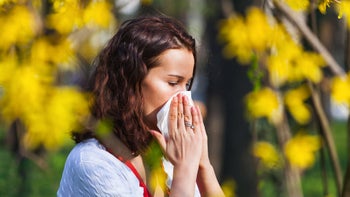
levocetirizine
Levocetirizine (Xyzal Allergy) is an antihistamine. It's used to relieve allergy symptoms and chronic hives in adults and children. Levocetirizine (Xyzal Allergy) is available both over the counter and by prescription, and comes as a tablet and a liquid. Your dosage can depend on your age. This medication is taken by mouth, typically once daily. Some side effects of levocetirizine (Xyzal Allergy) include drowsiness and the common cold-like symptoms.

What is Levocetirizine (Xyzal Allergy)?
What is Levocetirizine (Xyzal Allergy) used for?
Short-term relief of allergy symptoms (sneezing, runny nose, itchy or watery eyes, itching of the nose or throat)
Relief of itchiness due to chronic (long-term) hives - by prescription only
How Levocetirizine (Xyzal Allergy) works
Levocetirizine (Xyzal Allergy) is an antihistamine. It blocks histamine, a natural chemical in your body that can cause allergy symptoms like itchiness, itchy eyes, or runny nose. By blocking histamine, levocetirizine (Xyzal Allergy) helps relieve allergy symptoms.
Drug Facts
More on Levocetirizine (Xyzal Allergy) essentials

Get your GoodRx coupon

What are the side effects of Levocetirizine (Xyzal Allergy)?
Common Side Effects
- Sleepiness (up to 6%)
- Cold-like symptoms (up to 6%)
- Fatigue (up to 4%)
- Fever (4%)
- Diarrhea (up to 4%)
- Vomiting (up to 4%)
Other Side Effects
- Dry mouth
- Sore throat
- Cough
- Sleepiness
- Nose bleed
- Ear infection
Serious Side Effects
- Accidentally taking too much medication: fast heartbeat, flushing, extreme sleepiness, hallucinations, changes in vision, irritability in children
Source: DailyMed
More on Levocetirizine (Xyzal Allergy) side effects
The following side effects have also been reported
Along with its needed effects, a medicine may cause some unwanted effects. Although not all of these side effects may occur, if they do occur they may need medical attention.
Check with your doctor immediately if any of the following side effects occur:
Incidence not known
attack, assault, or force
bloody, cloudy, or dark urine
blurred or loss of vision
burning feeling while urinating
burning, crawling, itching, numbness, prickling, "pins and needles", or tingling feelings
chills
clay-colored stools
confusion
decrease in the frequency of urination
decrease in urine volume
deep or fast breathing with dizziness
difficult or labored breathing
difficulty in passing urine (dribbling)
difficulty with swallowing or speaking
discouragement
disturbed color perception
dizziness, fainting, or lightheadedness when getting up suddenly from a lying or sitting position
double vision
fast, irregular, pounding, or racing heartbeat or pulse
feeling of constant movement of self or surroundings
feeling sad or empty
fixed position of the eye
general tiredness and weakness
halos around lights
headache
hives or welts, itching, skin rash
inability to move the eyes
increased blinking or spasms of the eyelid
irritability
joint or muscle pain
lack of appetite
large, hive-like swelling on the face, eyelids, lips, tongue, throat, hands, legs, feet, or genitals
light-colored stools
loss of balance control
loss of interest or pleasure
muscle trembling, twitching, jerking, or stiffness
nervousness
night blindness
numbness of the feet, hands, and around the mouth
overbright appearance of lights
puffiness or swelling of the eyelids or around the eyes, face, lips, or tongue
redness of the skin
restlessness
rhythmic movement of the muscles
seeing, hearing, or feeling things that are not there
seizures
sensation of spinning
shaking
shuffling walk
sticking out of the tongue
stomach pain
swelling of the face, feet, or lower legs
thoughts of killing oneself
tightness in the chest
trouble concentrating
trouble with sleeping
tunnel vision
twisting movements of the body
uncontrolled movements, especially of the face, mouth, tongue, neck, and back
uncontrolled twisting movements of the neck, trunk, arms, or legs
unpleasant breath odor
unusual facial expressions
unusual tiredness or weakness
upper right stomach pain
vomiting with or without blood
yellow eyes and skin
Some side effects may occur that usually do not need medical attention. These side effects may go away during treatment as your body adjusts to the medicine. Also, your health care professional may be able to tell you about ways to prevent or reduce some of these side effects. Check with your health care professional if any of the following side effects continue or are bothersome or if you have any questions about them:
Less common
Body aches or pain
dryness of the throat
hoarseness
redness or swelling in the ear
tender, swollen glands in the neck
voice changes
Less common
Change in or loss of taste
difficulty in moving
increased appetite
joint pain or swelling
muscle pain, cramp, or stiffness
nightmares
Other side effects not listed may also occur in some patients. If you notice any other effects, check with your healthcare professional.
Call your doctor for medical advice about side effects. You may report side effects to the FDA at 1-800-FDA-1088.

Pros and cons of Levocetirizine (Xyzal Allergy)

Pros
First-choice option for relieving allergy symptoms
Taken by mouth once per day
Liquids are fruit-flavored for better taste
Safe to take while pregnant or breastfeeding

Cons
Might make you sleepier compared to loratadine (Claritin) or fexofenadine (Allegra)
Might not be a good option for people with kidney problems because of higher risk of side effects
Tablets can't be used in children younger than 6 years

Pharmacist tips for Levocetirizine (Xyzal Allergy)

Levocetirizine (Xyzal Allergy) can be taken only when you have allergy symptoms every once in a while. But if you have allergy symptoms on a daily basis, taking it regularly according to the manufacturer's directions can give you the most relief.
Take levocetirizine (Xyzal Allergy) with or without food. If it hurts your stomach, try taking it with food to help.
For the liquid form: Use a medication dose cup or an oral syringe to measure your dose of levocetirizine (Xyzal Allergy). Ask your pharmacy to provide you with one if the product doesn't include it in its packaging or if you need extras. Don't use household spoons because they might not be accurate and might cause you to take the wrong dose.
If you have kidney problems, you might be more likely to experience side effects from levocetirizine (Xyzal Allergy). Don't use levocetirizine (Xyzal Allergy) if you have any kidney problems unless your provider said it's okay to do so.
Levocetirizine (Xyzal Allergy) might make you feel sleepy. Don't drive until you know how this medication affects you. Also, avoid drinking alcohol while taking levocetirizine (Xyzal Allergy) because this combination raises your risk of sleepiness.
Levocetirizine (Xyzal Allergy) can cause you to have trouble urinating or worsen any urinary problems you already have. If you experience this, contact your provider to see if you should try a different medication for your allergies.
Don't start any new medications while taking levocetirizine (Xyzal Allergy), especially other antihistamines, without talking to your provider or pharmacist first. Doing so can raise your risk of taking too much medication (overdose) and lead to severe side effects, including seizures, hallucinations (seeing things that aren't real), and even death.

Frequently asked questions about Levocetirizine (Xyzal Allergy)

How to save using GoodRx




What are the risks and warnings for Levocetirizine (Xyzal Allergy)?
Levocetirizine (Xyzal Allergy) can cause some serious health issues. This risk may be even higher for certain groups. If this worries you, talk to your doctor or pharmacist about other options.

Sleepiness
Risk factors: Drinking alcohol while taking levocetirizine (Xyzal Allergy) | Taking other medications that cause sleepiness | Age 65 and older
Levocetirizine (Xyzal Allergy) can make you sleepy, which can affect your ability to focus, think, or react. This side effect might be more likely to happen or more intense if you're over 65 years old, drink alcohol while taking levocetirizine (Xyzal Allergy), or take other medications that also cause sleepiness (e.g., opioids, certain anxiety medications, sleep medications). Don't drive or operate machinery until you know how this medication affects you.

Accidentally taking too much medication
Levocetirizine (Xyzal Allergy) and other antihistamines can be found in many over-the-counter and prescription products. Taking too much levocetirizine (Xyzal Allergy) or using more than one medication containing an antihistamine (including products used on the skin) can lead to an accidental overdose and cause serious side effects, such as seizures, hallucinations, or even death.
To prevent an accidental overdose, read package labels carefully. If you're not sure if a product has an antihistamine, ask your pharmacist. Don't start any new medications while taking levocetirizine (Xyzal Allergy) without talking to your provider or pharmacist first. If you think you or your loved one has taken too much medication, get medical help right away or contact a Poison Control Center at 1-800-222-1222.

Levocetirizine (Xyzal Allergy) dosage forms
Typical dosing for Levocetirizine (Xyzal Allergy)
The directions can be different depending on the levocetirizine (Xyzal Allergy) product you have. Be sure to check the medication box for specific instructions or follow your provider's directions.
In general, the dose is as follows:
Tablets (over the counter (OTC) or by prescription):
Ages 65 years and older: Ask your provider.
Ages 18 to under 65 years: The typical dose is 2.5 mg or 5 mg by mouth once per day in the evening. The dose depends on how severe your allergy symptoms are. The maximum dose is 5 mg in a 24-hour period.
Ages 6 to under 12 years: The typical dose is 2.5 mg by mouth once per day in the evening. The maximum dose is 2.5 mg in a 24-hour period.
Ages younger than 6 years: Ask your child's provider.
Ages 65 years and older: Ask your provider.
Ages 12 to under 65 years: The typical dose is 5 mL (1 teaspoonful) or 10 mL (2 teaspoonfuls) by mouth once per day in the evening. The dose depends on how severe your symptoms are. The maximum dose is 10 mL in a 24-hour period.
Ages 6 to under 12 years: The typical dose is 5 mL (1 teaspoonful) by mouth once per day in the evening. The maximum dose is 5 mL in a 24-hour period.
Ages 2 to under 6 years: The typical dose is 2.5 mL (one-half teaspoonful) by mouth once per day in the evening. The maximum dose is 2.5 mL in a 24-hour period.
Ages younger than 2 years: Ask your child's provider.
Follow your prescriber's instructions if you're taking the prescription solution because the age cut-offs are different.
More on Levocetirizine (Xyzal Allergy) dosage forms

Interactions between Levocetirizine (Xyzal Allergy) and other drugs
Using this medicine with any of the following medicines is usually not recommended, but may be required in some cases. If both medicines are prescribed together, your doctor may change the dose or how often you use one or both of the medicines.
- Acepromazine
- Alfentanil
- Alprazolam
- Amobarbital
- Anileridine
- Aripiprazole
- Aripiprazole Lauroxil
- Asenapine
- Baclofen
- Benperidol
- Benzhydrocodone
- Bromazepam
- Buprenorphine
- Buspirone
- Butabarbital
- Butorphanol
- Calcium Oxybate
- Cannabidiol
- Carbinoxamine
- Carisoprodol
- Carphenazine
- Chloral Hydrate
- Chlordiazepoxide
- Chlorpromazine
- Chlorzoxazone
- Clobazam
- Clonazepam
- Clorazepate
- Clozapine
- Codeine
- Cyclobenzaprine
- Dexmedetomidine
- Diacetylmorphine
- Diazepam
- Dichloralphenazone
- Difenoxin
- Dihydrocodeine
- Diphenhydramine
- Diphenoxylate
- Doxylamine
- Droperidol
- Enflurane
- Esketamine
- Estazolam
- Eszopiclone
- Ethchlorvynol
- Ethopropazine
- Ethylmorphine
- Fentanyl
- Flibanserin
- Flunitrazepam
- Fluphenazine
- Flurazepam
- Fluspirilene
- Fospropofol
- Gabapentin
- Gabapentin Enacarbil
- Halazepam
- Haloperidol
- Halothane
- Hexobarbital
- Hydrocodone
- Hydromorphone
- Hydroxyzine
- Isoflurane
- Ketamine
- Ketazolam
- Ketobemidone
- Levorphanol
- Lorazepam
- Loxapine
- Magnesium Oxybate
- Meclizine
- Melperone
- Meperidine
- Mephobarbital
- Meprobamate
- Meptazinol
- Mesoridazine
- Metaxalone
- Methadone
- Methdilazine
- Methocarbamol
- Methohexital
- Methotrimeprazine
- Methylene Blue
- Midazolam
- Molindone
- Moricizine
- Morphine
- Morphine Sulfate Liposome
- Nalbuphine
- Nicomorphine
- Nitrazepam
- Nitrous Oxide
- Olanzapine
- Opium
- Opium Alkaloids
- Orphenadrine
- Oxazepam
- Oxycodone
- Oxymorphone
- Papaveretum
- Paregoric
- Pentazocine
- Pentobarbital
- Perampanel
- Perazine
- Periciazine
- Perphenazine
- Phenobarbital
- Pimozide
- Piperacetazine
- Pipotiazine
- Piritramide
- Pitolisant
- Potassium Oxybate
- Prazepam
- Primidone
- Prochlorperazine
- Promazine
- Promethazine
- Propofol
- Quazepam
- Quetiapine
- Ramelteon
- Remifentanil
- Remimazolam
- Remoxipride
- Secobarbital
- Sertindole
- Sodium Oxybate
- Sufentanil
- Sulpiride
- Suvorexant
- Tapentadol
- Temazepam
- Thiethylperazine
- Thiopental
- Thiopropazate
- Thioridazine
- Tilidine
- Tizanidine
- Tolonium Chloride
- Topiramate
- Tramadol
- Triazolam
- Trifluoperazine
- Trifluperidol
- Triflupromazine
- Trimeprazine
- Zaleplon
- Zolpidem
- Zopiclone
- Zotepine

How much does Levocetirizine (Xyzal Allergy) cost?

Levocetirizine (Xyzal Allergy) contraindications
Allergy to cetirizine (Zyrtec)
Severe kidney problems or receive dialysis
Children age 6 months to 11 years with kidney problems

What are alternatives to Levocetirizine (Xyzal Allergy)?
Short-term relief of allergy symptoms (sneezing, runny nose, itchy or watery eyes, itching of the nose or throat)
Relief of itchiness due to chronic (long-term) hives - by prescription only
Short-term relief of allergy symptoms (runny nose, itchy nose, itchy or watery eyes)
Short-term relief of allergy symptoms (sneezing, runny nose, itchy or watery eyes, itchy nose or throat)

What is the latest news about Levocetirizine (Xyzal Allergy)?

Levocetirizine (Xyzal Allergy) images
Get savings updates for Levocetirizine (Xyzal Allergy)
Receive price alerts, news, and other messages from GoodRx about Levocetirizine (Xyzal Allergy) and other healthcare topics and relevant savings offers.By signing up, I agree to GoodRx's Terms and Privacy Policy, and to receive marketing messages from GoodRx.
References
Best studies we foundAmerican College of Obstetricians and Gynecologists. (2021). What medicine can I take for allergies while I’m pregnant?
Borowy, C. S., et al. (2023). Antihistamine toxicity. StatPearls.
Chartwell RX, LLC. (2022). Levocetirizine dihydrochloride- levocetirizine dihydrochloride solution [package insert]. DailyMed.
Chartwell RX, LLC. (2023). Levocetirizine dihydrochloride solution [package insert]. DailyMed.
Chattem, Inc. (2024). Childrens Xyzal Allergy- levocetirizine dihydrochloride solution [package insert]. DailyMed.
Chattem, Inc. (2024). Xyzal Allergy 24Hr- levocetirizine dihydrochloride tablet [package insert]. DailyMed.
Dykewicz, M. S., et al. (2020). Rhinitis 2020: A practice parameter update. Journal of Allergy and Clinical Immunology.
Johnson & Johnson Consumer Inc. (2023). Childrens Zyrtec Allergy- cetirizine hydrochloride tablet, orally disintegrating [package insert]. DailyMed.
Juniper, E. F., et al. (2005). Clinical outcomes and adverse effect monitoring in allergic rhinitis. Journal of Allergy and Clinical Immunology.
Micro Labs Limited. (2021). Levocetirizine dihydrochloride- levocetirizine dihydrochloride tablet, film coated [package insert]. DailyMed.
National Kidney Foundation. (n.d.). Dialysis.
Nordeng, H., et al. (2023). Transfer of ceterizine/levocetirizine into human breast milk and estimation of drug exposure to infants through breastfeeding: A human lactation study from the ConcePTION project. Basic and Clinical Pharmacology and Toxicology.
Patel, R. J., et al. (2023). Biochemistry, histamine. StatPearls.
Sun Pharmaceutical Industries, Inc. (2024). Cetirizine hydrochloride tablet, chewable [package insert]. DailyMed.
Browse medications
View AllResearch prescriptions and over-the-counter medications from A to Z, compare drug prices, and start saving.

















